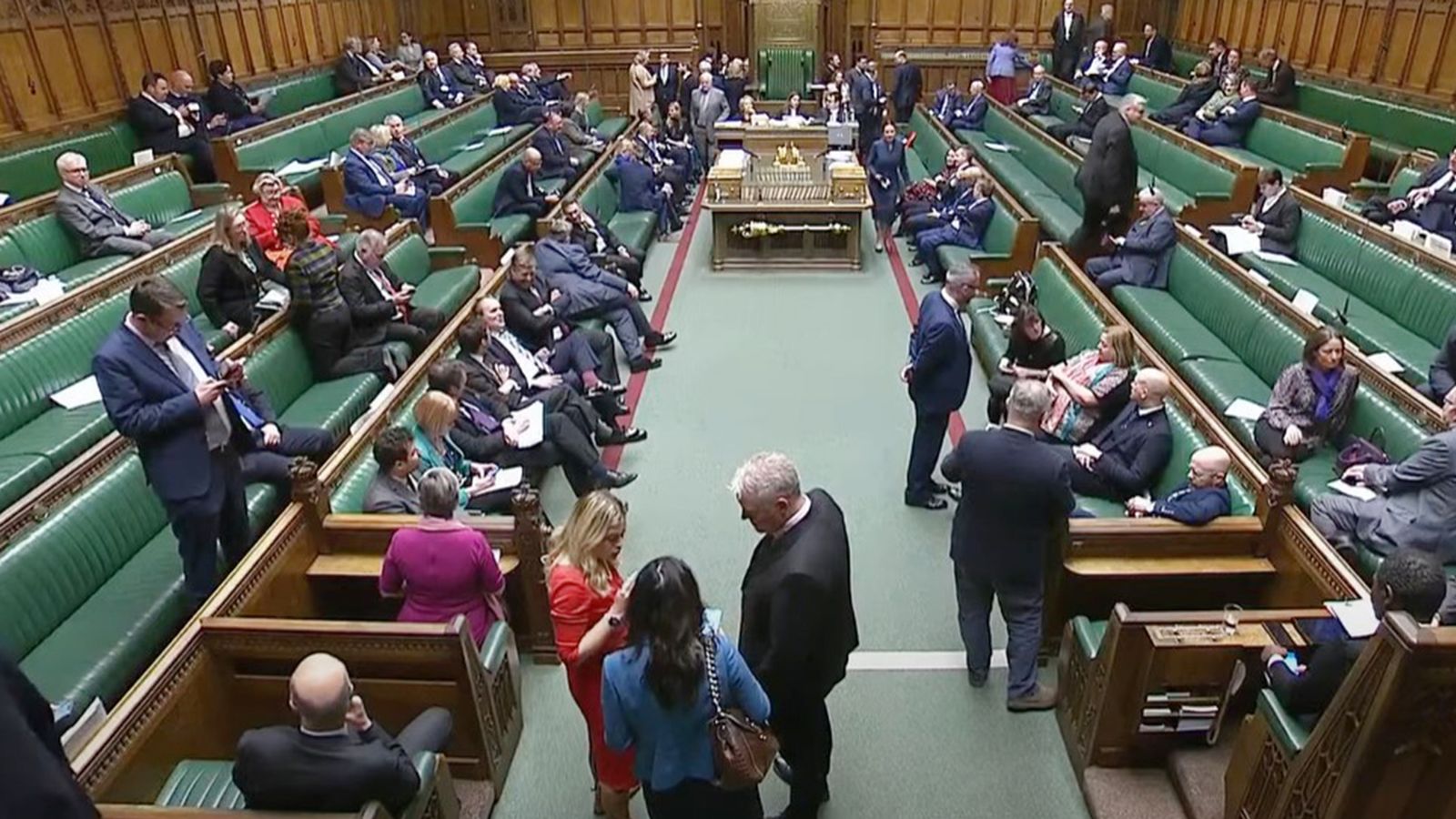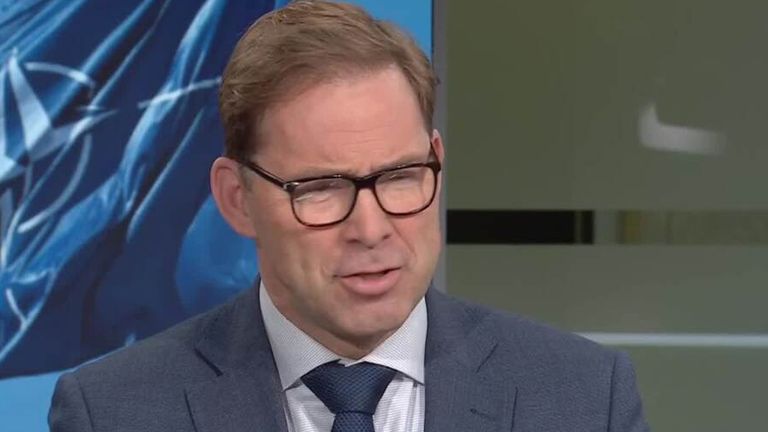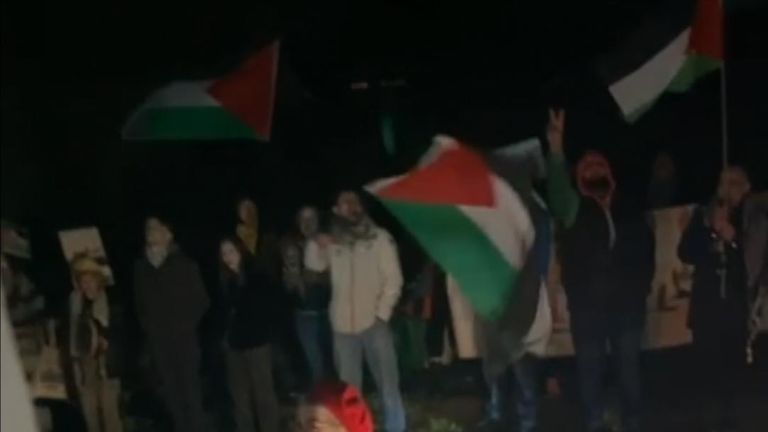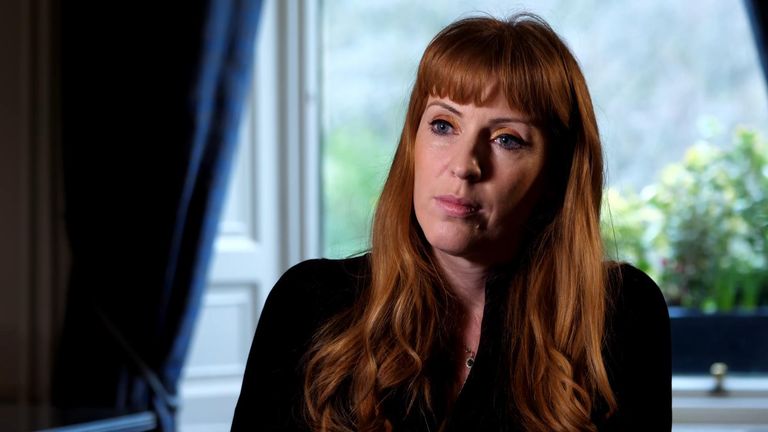Ministers urge police to make ‘robust’ use of powers over safety fears


Ministers have urged police forces to use “robust” measures to tackle protesters who “intimidate and harass” MPs over their stance on the Israel-Gaza conflict.
In a letter to chief constables, seen by Sky News, security minister Tom Tugendhat and policing minister Chris Philp said the demonstration outside the home of Conservative MP Tobias Ellwood was an example of “unacceptable” actions that risk having a “chilling effect on democracy”.
Politics Live: Starmer calls for lasting ceasefire in Gaza
More than 60 people, some holding Palestinian flags and leading chants, gathered at the Bournemouth East MP’s home last Monday.
The letter from the two ministers said: “The intimidation of democratically elected representatives is unacceptable.
“It’s important that our elected representatives are able to feel safe in their homes, free from fear and harassment.
“I’m strongly concerned about the chilling effect that undermining this could have on our political discourse, as well as on the willingness of prospective candidates to step forward and provide our communities with the representation they deserve.”
The letter acknowledged the “operational independence” of the police before listing the powers they can use to deal with protesters “robustly”.
Please use Chrome browser for a more accessible video player

0:24
Protesters descend on MP’s home
It said that given this year will likely see a general election it is “all the more important that candidates, both locally and nationally, are free to make their arguments to our communities without fear”.
Advertisement
It added: “You have my full support in making robust use of all your powers to ensure that the security of our elected representatives is protected, and our democratic values upheld.”
The unusual intervention comes amid increasing concern about MPs’ safety.
This month Conservative MP Mike Freer announced he would quit parliament after a series of death threats and an arson attack on his office.
Labour deputy leader Angela Rayner also told Sky News she no longer goes out socially because she is scared of death threats and protest confrontation from those opposed to her party’s stance on the war.
Please use Chrome browser for a more accessible video player

2:09
Angela Rayner ‘no longer goes out’
It follows the murders in recent years of MPs Jo Cox and Sir David Amess in their constituencies.
Speaking to The Telegraph, which first reported on the letter, Mr Tugendhat referenced the killing of Ms Cox eight years ago as he accused those who target politicians of “silencing democracy”.
He told the newspaper: “While I champion the right to protest and of course think it’s important that people have the right to express their views, everyone must have that right – not just loudmouth thugs who want to silence everybody else.”
Mr Ellwood separately wrote a piece for The Telegraph in which he warned of a growing trend of public servants facing “intimidation and threats”.
He said MPs “including myself, are now troubled by our ability to attract the next generation of talent”.
Read More:
Man admits calling Tory MP Mike Freer’s office saying ‘I’m coming for you’
MPs are wearing stab vests to meet constituents ‘concerning’ – report
Click to subscribe to Politics at Jack and Sam’s wherever you get your podcasts
The former defence minister and his family were not at home during the demonstration last week, after being warned by police to stay away.
He has said he doesn’t know why he was targeted given he has not taken a particularly strident pro-Israel view.
Protests have been held across the country in recent months to call for a ceasefire, as the death toll from the Israeli bombardment of Gaza continues to rise.
There have also been warnings of a growing volume of antisemitic incidents in the wake of the Hamas attacks on 7 October, amid heightened tensions over the conflict.
Mr Ellwood said: “Though this was the first pro-Palestinian targeting of an MP’s house, it is far from an isolated incident.
“Fellow MPs agree – we are witnessing a growing trend where public servants increasingly face intimidation and threats.”